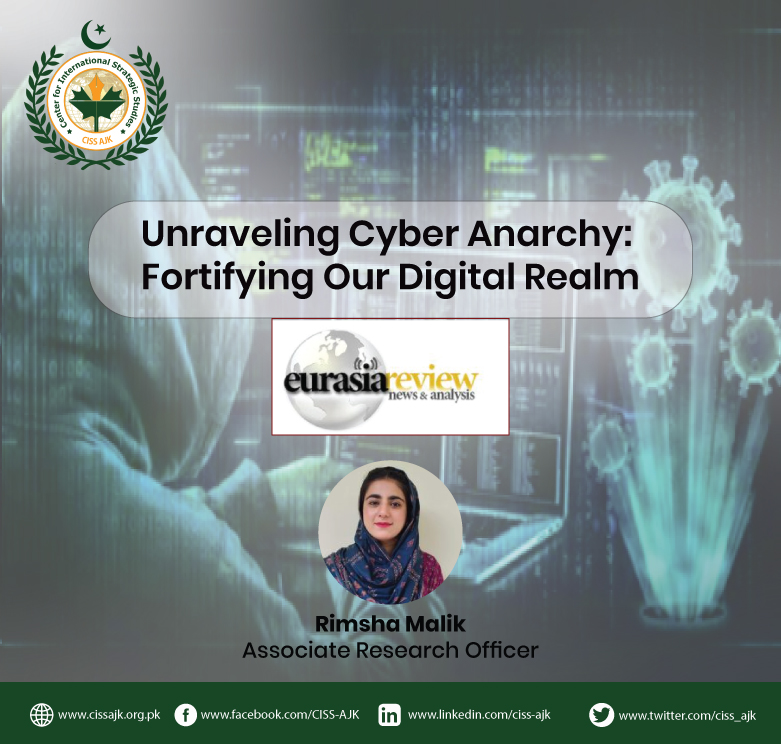600
Much like the physical world, there is a virtual/digital world which is also characterized by anarchy. Challenges and threats emanating from the cyber world are as serious and consequential as those of the “real” world of traditional security.
Today, the realm of world security is not only about “bullet vs. bullet,” it is also about “click vs. bullet.” The internet has changed the way we share information, interact, and develop on a global scale. It has had a significant impact, bringing about previously unheard-of breakthroughs in connectedness, equality, and human prosperity. But in addition to these astounding developments, the digital world often portrays more somber truths. It has developed into a haven for disinformation, cyber threats, data theft, and digital authoritarianism that jeopardizes peace and stability.
In this age of lightning-fast technical development, everyone involved in the problem-solving process needs to share some of the blame. The digital ecosystem, which once offered almost endless possibilities, now necessitates group action to reduce the risks that come with it. It is critical to recognize the interdependence of people and technology and the significant influence they have on one another as we negotiate this challenging landscape. The need to counterbalance accountability in the digital domain is central to this subject matter. This means that the dynamics of the digital ecosystem will fundamentally change such that defenders will now have the upper hand against harmful actors. To strengthen cybersecurity defenses, improve resilience, and prevent sensitive data from being misused, coordinated actions are needed.
The ongoing and intense hegemonic battle between the United States and China can be explained by the conflict over big data hegemony. Thus, gaining a competitive edge in AI technology may come from acquiring more data through connections with more governments. To dominate AI technology, the United States and China plan to create their own exclusive network platform, or value bloc. As such, friendly nations like the United States and China may be compelled to adopt a binary framework. Being on either side of the ROK, a state with such intimate ties to both blocs, is bound to incur significant losses.
The evolution of the ICT threat landscape, which is getting harder to navigate and more complicated, is worrying states more and more. By improving their precision, frequency, scale, and effect as well as making them more difficult to identify and neutralize, emerging technologies like artificial intelligence and quantum computing have the potential to either create entirely new dangers or greatly amplify those that already exist.
The complexity of digital supply chains, the digitalization of control systems in critical infrastructure, and the reliance on ICTs to deliver essential public services raise the danger of malevolent use of ICTs by extending the so-called attack surface. Ultimately, the threat landscape is primarily shaped by a complex web of entities within the ICT domain, including but not limited to States.
Given this, it is not unexpected that the topic of dangers has become increasingly prominent in multilateral talks about ICTs and global peace and security. More than 100 contributions on this topic were made by States and the multi-stakeholder community in the framework of the Open-Ended Working Group on security of and the use of information and communications technologies 2021-2025 (OEWG) in 2023 alone.
Complex interdependencies and emerging technologies are opening up new avenues for human development while also highlighting weaknesses in our digital infrastructure. Artificial intelligence and next-generation interconnectivity are becoming more widely used, which increases the complexity and risk of technological systems and increases the effect and destructiveness of cyberattacks. Malicious actors are taking advantage of these weaknesses to carry out espionage, steal intellectual property, and launch destructive assaults on vital infrastructure. These actors include state-sponsored organizations and criminal syndicates. Autocratic nations such as China, Russia, Iran, North Korea, and others are employing sophisticated cyber capabilities to aggressively pursue goals that jeopardize both international security and economic development. Cyber-enabled influence operations and ransomware attacks are examples of these threats that go beyond classic espionage and have caused significant disruptions to businesses and essential services globally.
To improve the resilience and defensibility of our digital ecosystem, stakeholders must work closely together over the long term as the digital landscape changes. The five pillars of this strategy—defending vital infrastructure, upending threat actors, influencing market forces, investing in resilience, and forming global partnerships—are meant to promote collaboration between the public and private sectors. The States must implement two significant changes to achieve these goals: redistributing the burden of cyberspace defense and realigning incentives to reward long-term investments. The most capable players must assume increased responsibility for safeguarding the digital ecosystem, rather than placing the entire responsibility of managing cyber threats on end users. A secure and governed cyber world is, therefore, a key concern of the international community, including the south Asian nations. The task of maintaining cybersecurity in South Asia in the face of the complicated emerging cyber challenges, ranging from regulatory issues to lack regional cooperation, involves a mosaic of issues that needs both public and private participation
Cyber threats must be addressed immediately in Pakistan due to the growing digitization of governmental services and key infrastructure. Pakistan must strike a balance between its ties with China and the United States while defending its interests as a country at a crossroads of geopolitical interests. To strengthen cybersecurity defenses and reduce the threats presented by hostile actors, cooperative actions with international partners are essential. Adopting the tenets of this plan would help Pakistan become more resilient to cyberattacks and maintain the stability of the global digital economy. For Pakistan’s progress and security in the digital age to continue, it is necessary that it actively participate in multilateral discussions and initiatives addressing ICT security.
Rimsha Malik
Rimsha Malik is an Associate Research Officer at Centre for International Strategic Studies AJK.



